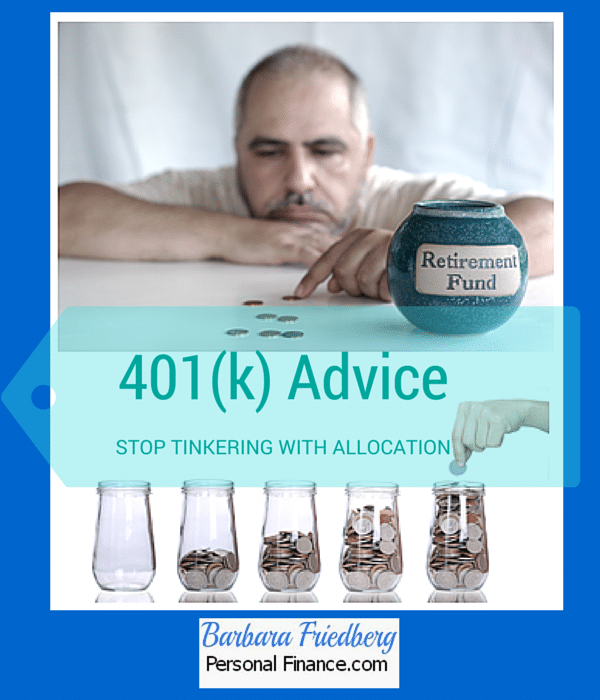Keep Your Fingers Off the 401(k)
Retirement accounts functioned differently just a few decades ago. We mailed deposits to our retirement accounts, or banks made deposits out of our bank accounts and into the brokerage account. To change our asset allocation, we called our stock broker, and he either agreed with us or tried to talk us out of making a bad decision.
Now, thanks to the internet, we can see our 401(k)s with the touch of a button. We can tweak and trade to our heart’s content, and there’s no one to dissuade us.
Is this ‘opportunity’ of easy 401(k) access good or bad for us?
Most people headed for retirement have two big assets, a home and a 401k. Unfortunately we treat those two assets quite differently when we should treat them the same way. We live in our homes, invest in regular maintenance, and only make big improvements, such as a major repair or remodel, when investing in a big project makes good sense.
Yet we view our 401(k)s as something that should be disturbed, and often. We jump online, tweak our asset allocation, or buy something based on a hot tip.
Instead of tinkering with your 401(k), you should treat it more like you treat your house.
Choose the home, or the 401(k) asset allocation, that fits your lifestyle and risk tolerance. Then, invest in maintenance — those regular deposits and matching funds from your employer. Finally, make changes only when absolutely necessary. When you tinker with your 401(k), you’re putting your future at risk.
Adjust Your 401(k) at Your Own Risk
Instead of seeing your 401(k) as a collection of moneymaking products, think like a portfolio manager. Investment experts visualize portfolios as sets of containers: a certain container for domestic investments, a container for international investments, a bond container, a cash container, and possibly more.
The size of each container depends on how close you are to retirement. When you’re young, your 401(k) has time to bounce back from setbacks, and bigger risks give you bigger chances for rewards. At a younger age, invest more of your money in stocks, stock mutual and exchange traded funds to maximize your returns. As you get closer to retirement, however, your 401(k) needs stability. The containers for more stable investment vehicles, like bonds, money market securities, CDs, and cash grow larger, while the containers for more volatile securities grow smaller.
When you make a trade within your 401(k), you’re not just losing the present value of what you traded. You’re losing all of the future value that the investment could have generated over the long term — the miracle of compound interest — for the hope of some short-term gain. Additionally, you’re sabotaging the strategy behind your asset allocation, which is designed to get maximum growth according to your risk tolerance while also providing a hedge against disaster.
The closer you get to retirement, the less you can afford to tinker with your asset allocation.
How to Resist 401(k) Temptation
As your baskets appreciate in value, they often grow out of proportion with your asset allocation plan. For example, if the investments in your bond basket perform much better than the investments in your securities baskets, you might end up with too much money in your bond basket. If you want more visibility into your investments but still need to avoid temptation, you might like a free tool such as PortfolioMonkey.com. PortfolioMonkey can help with your asset allocation and annual rebalancing.
Another way to resist tinkering with your 401(k) is to choose a one-size-fits-all retirement fund, such as one of the Fidelity Freedom Fund series. These target date funds have an end date — for example, the Fidelity Freedom 2025 Fund (FFTWX), which assumes you’ll retire in 2025 — and their asset allocation changes as funds approach the end date. When they hit their end dates, all of the Fidelity Freedom funds merge with the Fidelity Freedom Income Fund (FFFAX), which has the goal of providing stable and steady retirement income. Your fund manager handles the rebalancing for you, and you don’t tinker with individual securities.
You need your retirement money, so stop treating it like a vehicle for day trading. Instead, treat it the way you’d treat your home. Build it, maintain it, and only remodel it on occasion.
This post is featured on behalf of Michaela Kajiwara.

